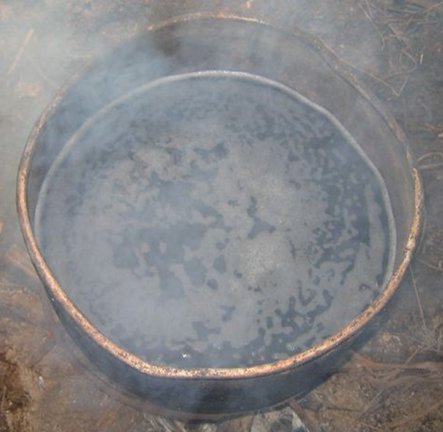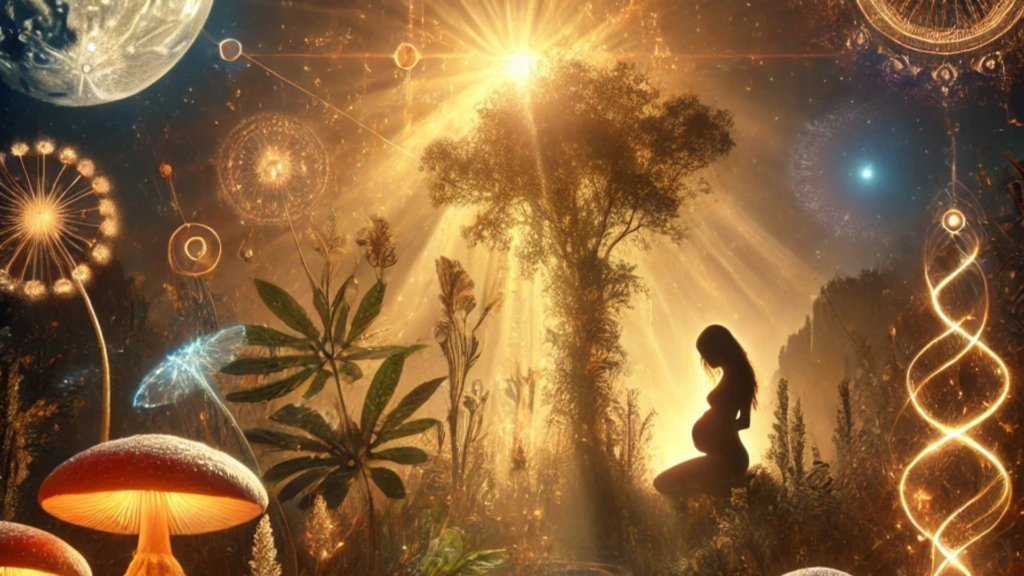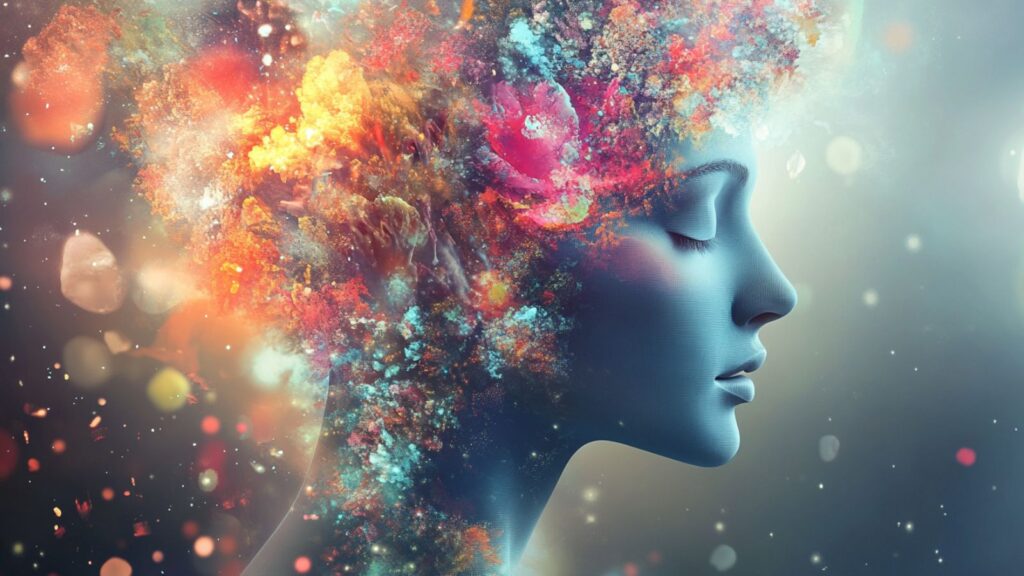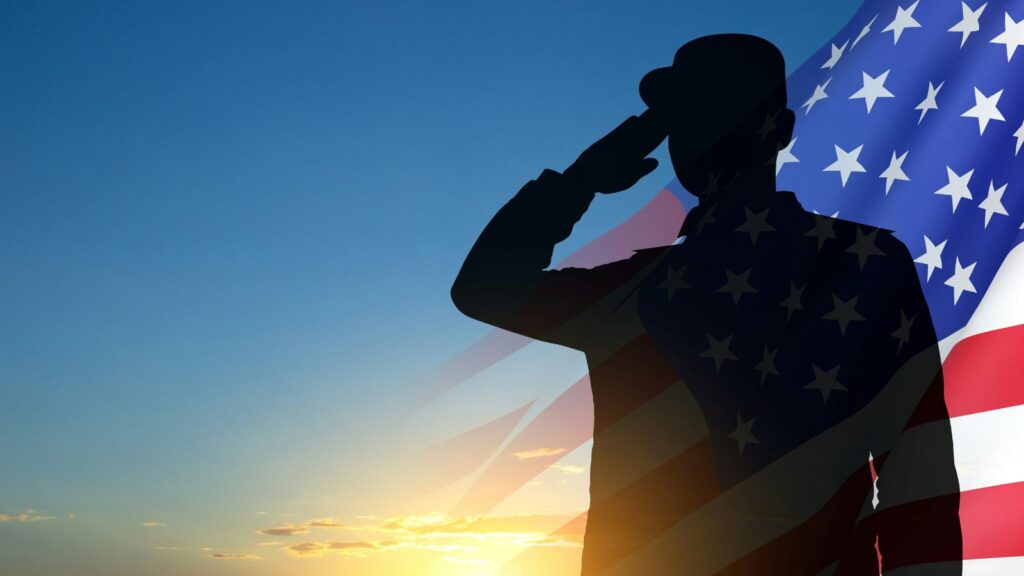[The Ayahuasca Monologues] • When going into my first experiences with ayahuasca, I was deeply absorbed in the work of Pablo Amaringo. I was spending more and more time looking over his paintings, many of which displayed images of other worldly dimensions with golden palaces in the sky. In the summer of 2004, I was set to travel to South America for a ten-day dieta involving work with ayahuasca, as well as other healing plants like bobinsana. I had been drinking ayahuasca in Mestizo shamanic ceremonies for a little over a year before this dieta, and this was going to be my first complete immersion into the rainforest for repeated exposure to its thunderous lessons.
One of the main intentions I had for my upcoming dieta was to heal the broken lines of love between my father and me. He had passed away just two months before I was scheduled to leave for the Southern Hemisphere. He suffered a tragic and sad death. His landlady had found him slumped over the island divider in the kitchen, still gripping a glass of Chivas Regal in his lifeless hands. My father’s passing had been anticipated for many years, as he struggled with the affliction of alcoholism for most of his adult life. The news of his death knocked the wind out of me when I heard of it over the phone one lonely morning. My family and friends supported me during the days leading up to his wake. Memories overwhelmed me at night — of a man who hurt me like no other, but who also gifted me with some of the greatest moments two people can share.
My dad struggled with multiple addictions since before I was born, and they wreaked havoc for most of our relationship. Addiction is like a fire, the more space you give it, the more the flames will rage. Genius, too, is like a fire, and it works in similar ways. The more you offer yourself to it, the more its brilliance will shine. My father was like a house that contained both of these fires, constantly burning.
The way Dad passed, it seemed like the fires of addiction may have won out, leaving him dying a drunkard’s death. But in the time leading up to his funeral, I also remembered him as a brilliant man, alive and struggling with a pain deeper than his waking self. His addictions seemed to run far back into the Irish gene pool. Generations of executed poets and failed revolutionaries swam within his belly as he shot back the spirits at the bar he and my mother opened and ran for more than 25 years. His tongue was a palate coated with myriad songs about love and confusion, humor and pain, with an aching for redemption.
At Pop’s wake I referred to Dylan Thomas’s poem, “Do Not Go Gentle Into That Good Night,” in regards to the way Dad lived his life. More likely than not, he did not go gently into the waning of the light. He did not die a good death. I imagined that he experienced fear and confusion, up until the moment, where perhaps he saw the one he always talked about seeing at his death — Jesus. The type of Jesus my father often spoke of was the same type that Johnny Cash and Woody Guthrie sung about. He sounded like a Jesus who would bring calm, and ease the pain for the sick and the hopeless, the poor and oppressed.
I suppose that to live a life of passion, one must burn. One must feel the fire in the pit of their stomach and eventually learn to direct that fire, least it consume you. There was a time in my father’s life when that fire was channeled into many joyous displays of theatrical political activism, leaving those watching and involved both shocked and amused. He and my mother were Irish immigrants to New York City at a time of tumult in Northern Ireland. It was the 1970s, the time of “the Troubles,” when suffering and resistance were at a peak in the northern six counties. There were protests and there were bombs; there were bullets, and there was blood. My father and mother held strong to their convictions that everything would be much better the sooner the British crown extricated itself from the North.
In New York City, they helped form Irish Northern Aid, an organization that brought awareness to the situation in Northern Ireland while also raising money for the families of those whom they considered to be political prisoners — people like Bobby Sands, Francis Hughes, Joe McDonnell, and the seven other men who died on a hunger strike in 1981.
I was always aware of this aspect of my father’s life. He was linked with a long line of rebel hearts, seeking a righteous resolution to some of the uglier sides of human nature. His name was known in the North, and many whom he worked with during those years held him in great esteem. I often think about what deeper motivations may have moved my parents to take the plunge into a life of high risk and coded phone conversations. They must’ve had a firm and raging longing for freedom.
Ireland is a land that has endured endless waves of struggle between a beleaguered people and a heavy-handed colonial system, which has played itself out in every generation on the world’s stage for hundreds of years. It makes sense to me that such a longing for freedom would be linked with the land, because the land has played such a major role in the story of Ireland. And my parents were people of the earth, raised on small farms in the countryside, listening to the land cry. Their movement for freedom was one that left some indelible marks on themselves and our family.
Of course, the desire for freedom manifests in many different ways. The world is well versed in stories of people fighting to get freedom from some type of oppressor. There are also tales of becoming free of what’s holding us back, and spiritual traditions that talk of a freedom found in perceiving existence in one infinite moment of understanding. There are many tales from different cultures that speak of this journey — to be free from all suffering, to finally grasp knowledge of oneself and become the lord and master of one’s own mind. It was my own search for this type of freedom that led me to ayahuasca.
A few days after the funeral, my mother and I were speaking outside her house. I told her about the dieta I was soon leaving for. I told her I respected her and Dad’s early choices to live how they had, and that I believed I was following in their footsteps by going to South America. She understood what I was saying, but didn’t really know the surrounding cultural elements. “They’re not witch doctors are they?” she asked. I could only laugh and assure her that I was not going to any witch doctors…that I knew of.
I flew into Peru International Airport and then took a short, bumpy flight to Pulcallpa, where I met the rest of the intrepid travelers headed into the Amazon for this dieta. From Pulcallpa we drove a couple of hours down some dirt roads, only stopping once to make some form of “tribute” (meaning pay-off) to the local police force lounging on that stretch before finally stopping at the Rio Ucayali. We hoped into two slim motorized boats and coasted along the serene river into the heart of the jungle.
The ride was quiet, yet upbeat. The sun shined bright, reflecting sharply off the top of the dark waters. We arrived at a nondescript piece of land, and hiked into the jungle for another hour. Finally reaching the encampment, we choose our own tambo open-air hut, which was to be our individual sleeping quarters for the next eleven days. After settling in, we all met up for a collective meal, eating, conversing, and laughing for hours, knowing that this was to be our last full meal until the dieta was over.
The day turned to night, and the darkness quickly crept its way into our congregation. One by one, we retired to our tambos, saying good night and good luck. I pulled the mosquito net over my foam “bed” situated atop a slab of wood, and then drifted off to sleep.
In the first ceremony, I set up my temporary altar in front of me. A Shipibo thread-work featuring a green glowing fish was the focal point around which I situated the rest of my concentration aids. I had a bottle of Florida water, and two pictures laid out on the Shipibo artwork. The first was of my father and myself when I was around six-years-old. In the image, Dad was leaning down, his face close to mine, looking towards the camera lens, as my eyes gaze towards something out of range. The other picture was taken roughly fifteen years later. This time I had the bigger frame, and my arm was stretched across his back. His face appeared drained, no doubt from the many years of drinking. He looked pale and frayed at the edges; deep lines of pain now engraved into his face. In the first picture, he was gripping my shoulder in a show of affection, as if to say, “Come on now, I believe in you. You can do it.” In the second picture, it was me striking this pose. Though, I felt so much pain from our relationship, I still had faith in my father. I wanted my dad man to wake up again.
I was seated next to a very large older man named Thor in the ceremonial circle. I liked Thor. I saw him as a man who had been down similar roads as my father, and I later learned that he was also the same age as Dad.
Thor was good friends with the shaman and was placed directly to his right, and I to the right of Thor. The group sat in a large circle in the maloca, the ceremonial structure in which we drank. It was situated next to one of the many rivers flowing through the heart of the Amazon. The day was clear, but the high branches of the trees in the forest blocked out much of the light from the sun.
We passed around the ceremonial cup, and then waited. When the ayahuasca started to twist and kick inside of me, I noticed that everyone in the group seemed pushed towards the brink of their own psychic thresholds. An invisible quilt of empathy gently fell upon us. We were tucked in tightly with the beautiful feeling of togetherness. It was a unity that allowed each individual the space to go through his or her own work.
The shaman started off singing a number of icaros until the ayahuasca came on full tilt. My thought patterns oscillated between notions of never feeling so alive, and powerful moments of confusion and jaw-clenching panic. What I usually referred to as my mind now resembled a vast expanse of fractalizing geometric patterns swirling through empty halls of silence. If I were able to focus on that silence (which I did like a toddler struggling to walk), my mind would become a fragile container for the many dimensions of self. This container was like a new level of awareness that was being born in me, growing a fraction at a time. In this state, I watched memories of my “waking self” swish and weave into the memories of dreams I’ve had in my life. It was becoming difficult to discern between the two.
As the icaros, sung by our guide, shimmered in visibly colorful patterns around us, these two selves seemed to move through the space of my mind’s eye like a caduceus. I felt like I was drowning in a fountain of deep life, and the deeper I sank, the more alive I felt, yet I checked in with myself repeatedly and asked, “Am I dead?”
Most of my experiences with ayahuasca up until this dieta often had me going down into an underworld. Each time I drank I learned a harsh lesson about the darker workings of my own mind. Paranoia, anger, shame and fear were usually portals I needed to walk through in order to gain some sort of ability to understand how to navigate out of my own personal prison. I was still struggling to find a balance during these experiences, many of which had been excruciating. I was repeatedly pulverized by the power of this plant. I regarded it with fear and respect. This was something I needed. Ayahuasca was strong enough to wrestle my mind to the ground and open my ears to the sound of my heart.
That first ceremony proved no different than earlier journeys back home. I was forced to plunge deep into psychic waters, an ocean helmet diver breathing in the shaman’s icaros as my single line of oxygen. His tones were tools to get the work done, and I focused my breath to take them in, to keep centered while finding my way up from this abyss. Immersed in these mercurial realms, the ayahuasca helped me process and reconcile heavy emotions that I’d never fully dealt with before. The whole time I listened intently to the shaman’s songs. Ancient lessons were being taught in those simple sounds. And even though I didn’t know what the words were, I knew exactly what they meant.
Then I had a vision of my father. I saw him in another dimension, at the mercy of the ruling force therein. But this ruling force was not benevolent. It was mean and vengeful. It was a realm where my father’s spirit had almost forgotten who he was in the life he just left, like one forgets their dream in that liminal state before waking. His spirit was in a place that burned and compressed everything around him. This ruling force (whatever it may have been) enjoyed inflicted pain upon my father, yet there was an understanding that this was necessary for him. And that was it, just as quick as the vision came, my awareness was pulled back to the ceremonial space, where the shaman shook his chacapa, healing a person nearby.
The ayahuasca worked itself through me in waves that felt like birth contractions. I endured moments of sharp pain that would eventually open into feelings of bliss. Fear or anger would rise within me, making me want to throw up. I grabbed a bucket and knelt over it, but nothing would come out. I tried again and again but all that surfaced were dry heaves and mucous. All the while, Thor was throwing up profusely. I felt a resonance with him puking his guts out sitting next to me. Somehow I understood that this man was helping me through his purging.
Then it occurred to me that Thor was puking because I couldn’t. On some energetic level, Thor was processing those things that I was having trouble with. The “energetic” self is said to expand a few feet out beyond one’s physical body. Thor was seated right next to me, so it made sense. I saluted him in my mind’s eye. My respect and reverence then expanded out to every person in the ceremony. I was in awe at the strength that every individual brought to this work. As the plant tunneled through my system with the elegant grace of a bulldozer, I mumbled words of thanks and praise to all these heroes and heroines before falling back into a lump on the ground.
I have heard many people speak about hearing a voice that they call “Grandmother,” during ceremonies. Most people say Grandmother is another reference to the spirit of ayahuasca. They say this, too, because ayahuasca has the temperament of a firm and compassionate grandmother. She will shower love and provide a voice of discipline when needed. People often speak of setting an intention or asking a question to the plant, and I have heard many say that they heard “her” voice speaking to them. That day I caught “her” gentle voice urging me to practice patience with myself, because some things take whole lifetimes to purge.
With those words, I was brought back to the last time I saw my father alive. It was a few months before he passed. I went over to visit him at the house where he was renting a room. We spoke about trivial matters. When I announced my exit he said to keep in touch. As he walked me to the door, we turned to say goodbye as we always did. We hugged, and for some reason I squeezed his barrel-chested frame harder than usual. I held onto him like I did when I was a child. He recoiled a bit, but then surrendered to the hug, while I told him that I loved him. He returned the hug, and wished me well as I exited the house. I began to cry as I walked up the pebbled driveway to my car, a voice, not unlike the voice of “Grandmother” spoke to me and said that this was going to be last time I ever saw my dad alive again.
I replayed this scene over and over in my head as Thor sat and purged. I began to cry fierce tears, tears that shot out my eyes like bullets, tears that were equal parts angry to equal parts sad. At that point, I knew I needed to separate myself from the rest of the group and unleash this furious hurt into the skies of the Amazon. “This earth will protect me. The Amazon will sooth me,” I thought, as I ran out of the malaco and moved along the thin path towards a view of the river down the lane. I sat on a plank of wood and howled and moaned like a wounded beast. My voice ripped a hole through the air my released pain.
Then I cried. I cried for my father. I cried for me. I cried for my family. I cried for the Irish. I cried for the British. I cried for the world. But mostly I just cried.
The rainforest held me in her embrace while the sorrow passed through me. This sadness was a gift and I sat there with it. It was the sadness my father had run from so violently, the one that had also dogged me my whole life. It was the sadness I imagine the earth feels when she watches so many of her children die. After all, everything buds, blooms, and then withers away. But she lives on, watching it all with love and non-invasive guidance. This sadness, I came to see, also contains great joy. But it only becomes joyful once one is able to face and embrace it. You have to sit with it, and not think about when it will lift. I sat with that sadness all afternoon, coming to terms with it, learning to love it.
Eventually, I walked back to the malaco for the closing of the ceremony. I thanked Thor for sitting next to me during the work. I looked out at the birds coasting over the river as the sun set in the distance, knowing that I’d been granted a healing, as well as my father.
Later that night, I thought back my uncle, cousins, and I carrying Dad’s casket, draped in the Irish flag, through the church doors. I felt the loss of never being able to hear the sound of his brogue and gruff voice again. All I had left were memories. Outside the church, a bagpiper played sweet and sullen tones. I stayed up for many nights afterwards thinking of all this. When the weight of these feelings finally broke on the shores of my tired mind, something revealed itself to me. Through this loss and pain, I now felt connected on a more intimate level to the world around me. I described it as “an initiation into the circle of humanity.” We may walk through the fire of existence quite differently, but it’s fire all the same. From losing my father, I discovered a profound reservoir of compassion bubble up like magma for all of us confused creatures bumping into each other at various speeds and directions in this life.
This dieta brought me to a similar place. The ceremonies provided me with a powerful metaphor for understanding my time on this earth. It was that of a very old and giant tree with branches reaching out high into a star-filled night. Tumescent roots dug deep into the fertile ground, sinking further and further towards a warm core. Many of my early experiences with ayahuasca were like these roots. My consciousness was guided through a dark underworld, stretching itself closer and closer to an understanding of what this realm had to teach. It was not always pretty, but necessary, in order to see the horizon offered by sitting atop the large branches above.
Before my time with ayahuasca, I was mostly focused on what the sky had to offer, wanting constantly be surrounded by quick-witted spirits, jetting around like lighting bolts. I had fun, but I was also frenetic and ungrounded. While sitting through many sessions, I learned that if I really wanted to see the world from the high branches, I had to ground myself, staying with my deeper emotions. Like those roots, I had to be in contact with the movements of the earth’s sighing soul. I could not have one without the other. The higher the branches, the deeper the roots.
Ayahuasca and the death of dad were two major teachers of this lesson. I had to stop running, sit down by the fire that burns inside us all, and absorb the heat in order to transmute and transmit those heavy earth stories. I am doing this to develop my own voice for singing my unique song. And I’d like to think that every being is here for the same purpose. It takes time and work, and some may take longer than others, but one thing is clear — the longer one sings in connection with his or her heart, the clearer their message becomes.
Dove Sta Memora
Image by jdrorer, courtesy of Creative Commons license.













